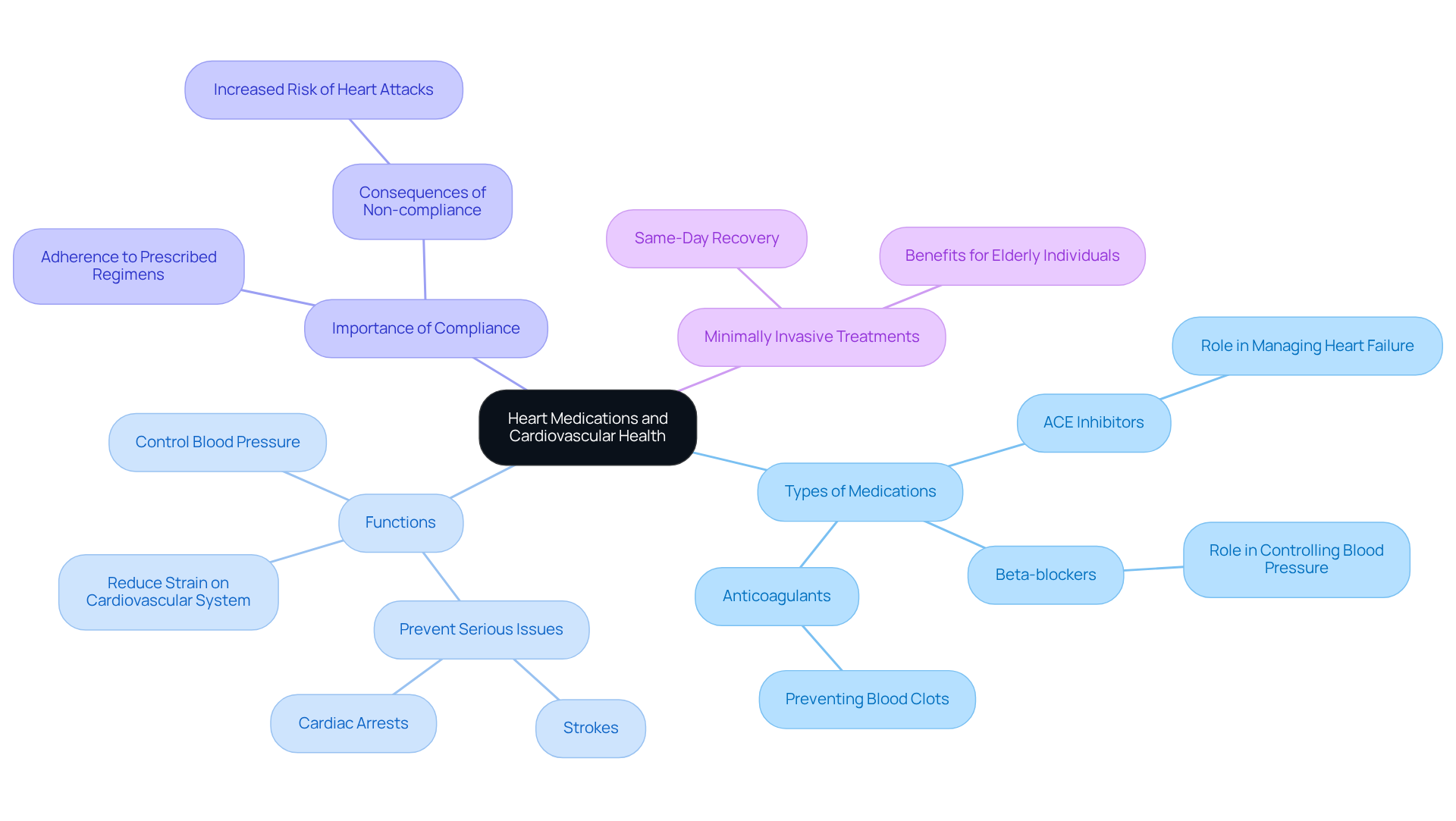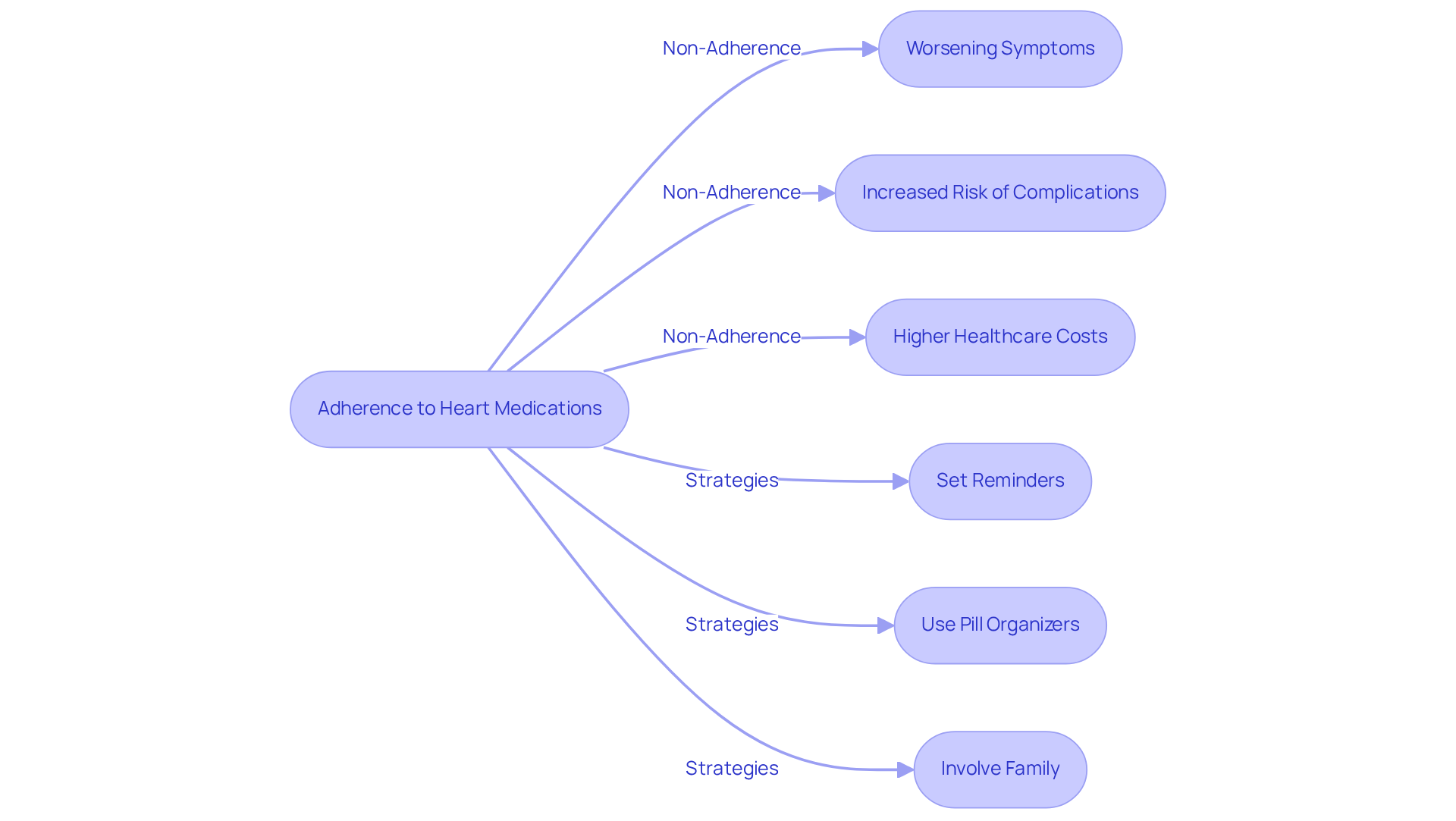


This article highlights the vital role that heart medications play in managing cardiovascular health. It presents a list of key medications used for various heart conditions, such as antihypertensives and anticoagulants. Understanding these medications is essential for effective patient care and adherence to treatment regimens. After all, non-compliance can lead to serious health complications and increased healthcare costs.
As you navigate your health journey, it’s important to recognize how these medications can support your well-being. By being informed, you can take an active role in your treatment. Remember, you are not alone in this process; many people share similar concerns.
If you have questions about your medications or how they work, please don’t hesitate to reach out for support. Your health is a priority, and there are resources available to help you manage your condition effectively. Together, we can work towards a healthier future.
Managing cardiovascular health can feel overwhelming, especially when it comes to understanding heart medications. These vital treatments are not just about addressing serious conditions like hypertension and heart failure; they also play a crucial role in preventing life-threatening events such as strokes and cardiac arrests. It's natural to feel uncertain about the various classes of these medications and the importance of sticking to prescribed regimens. How can you, as a patient, feel more confident in navigating your treatment options and communicating openly with your healthcare providers?
In this article, we will explore an essential list of heart medications, shedding light on their functions and the strategies for maintaining adherence. Our goal is to empower you to take charge of your cardiovascular health, ensuring you feel informed and supported every step of the way. Remember, you are not alone in this journey; together, we can work towards a healthier future.
Managing cardiovascular health effectively requires cardiac treatments, including a heart medications list, to address conditions such as hypertension, cardiac failure, and arrhythmias. These treatments help control blood pressure, reduce the strain on the cardiovascular system, and prevent serious issues like cardiac arrests and strokes. For example, the heart medications list often includes:
These are prescribed to manage heart failure, while anticoagulants play a crucial role in preventing blood clots.
At Amavita Heart and Vascular Health®, we understand the importance of comprehensive cardiac evaluations. We tailor treatment plans that align with your individual lifestyle and health goals. Our preventive cardiology approach integrates advanced risk evaluation tools with personalized interventions, ensuring you grasp the significance of adhering to your prescribed regimens. This understanding is essential, as non-compliance can lead to serious consequences, including an increased risk of heart attacks.
Furthermore, our commitment to minimally invasive treatments allows for same-day recovery. This means you can return home just hours after your procedure, which is especially beneficial for elderly individuals seeking effective and efficient care. We are here to support you every step of the way, ensuring you feel comfortable and cared for as you navigate your health journey.

Heart medications list can be classified into several categories, each serving distinct purposes, especially in the context of the cardiovascular challenges faced by skilled nursing facilities today. Understanding the heart medications list is essential for your health and well-being.
Antihypertensives: These include ACE inhibitors, beta-blockers, and calcium channel blockers. They help lower blood pressure and reduce heart strain, which is crucial for managing patients in skilled nursing facilities. This support can lead to a more comfortable life.
Anticoagulants: Medications like warfarin and newer agents such as rivaroxaban prevent blood clots, lowering the risk of stroke. This is especially crucial for older individuals, as it helps maintain their quality of life.
Statins: Used to lower cholesterol levels, statins help prevent the progression of coronary artery disease, a common concern in skilled nursing environments. By managing cholesterol, we can work together to support your heart health.
Diuretics: These medications assist in decreasing fluid accumulation in individuals with cardiac failure. By enhancing symptoms and quality of life, they play a significant role in improving overall care for individuals.
Antiarrhythmics: Medications such as amiodarone are utilized to control irregular heartbeats, ensuring a stable heart rhythm. This stability is essential for preserving health in older individuals, allowing you to enjoy life more fully.
Understanding these classes allows you to engage in informed discussions with your healthcare providers about your treatment options and the heart medications list. This knowledge contributes to better coordination of care and improved outcomes, ensuring that you feel supported every step of the way.

To communicate effectively with your healthcare team about your medications, it’s essential to feel comfortable and prepared. Here are some strategies that can help you engage in meaningful discussions:
By fostering open and transparent dialogue, you can enhance your treatment experience and improve adherence to your therapeutic plans. Remember, you are not alone on this journey; your healthcare team is here to support you every step of the way.

Following your heart medications list is essential for managing your vascular health, especially within the supportive framework of Amavita's CardioElite™ program. This program serves as a vital clinical support system, providing you with advanced, real-time diagnostic data and access to 24/7 cardiology consultation. Such resources significantly enhance proactive patient management and address the high cardiovascular readmission rates often observed in skilled nursing facilities (SNFs).
Understanding the importance of adherence is crucial, as non-adherence can lead to:
To promote adherence, consider implementing strategies such as setting reminders, utilizing pill organizers, and involving family members in your treatment management. Recognizing the critical role your heart medications list plays, especially alongside the comprehensive cardiovascular management provided by CardioElite™, can inspire you to stay committed to your treatment plan. Ultimately, this commitment can help reduce the risk of readmissions, ensuring your health remains a priority.

Managing cardiovascular health effectively relies on understanding and following a comprehensive heart medications list. These medications are crucial in managing various heart conditions, helping to lower the risk of serious complications like heart attacks and strokes. By appreciating the importance of each medication class—such as antihypertensives, anticoagulants, statins, diuretics, and antiarrhythmics—individuals can navigate their treatment options more confidently and engage meaningfully with their healthcare providers.
Throughout this article, we’ve shared critical insights highlighting the importance of effective communication with healthcare teams and the necessity of adhering to prescribed treatment regimens. Strategies for enhancing dialogue with healthcare professionals have been outlined, emphasizing the need for preparation, honesty, and clarity in understanding medication instructions. Moreover, the consequences of non-adherence have been starkly illustrated, underscoring the potential for worsening health outcomes and increased healthcare costs.
Ultimately, committing to a heart medications list not only fosters better health outcomes but also empowers individuals to take charge of their cardiovascular care. By prioritizing adherence and actively participating in discussions with healthcare teams, patients can significantly enhance their quality of life and reduce the risk of complications. Embracing these practices can lead to a healthier future, making it essential for everyone to recognize the invaluable role heart medications play in maintaining cardiovascular health. Remember, you are not alone on this journey; support is available, and taking these steps can lead to a brighter tomorrow.
What is the role of heart medications in managing cardiovascular health?
Heart medications are essential for managing cardiovascular health as they help control blood pressure, reduce strain on the cardiovascular system, and prevent serious issues like cardiac arrests and strokes.
What are some common types of heart medications?
Common heart medications include ACE inhibitors and beta-blockers, which are prescribed to manage heart failure, as well as anticoagulants that play a crucial role in preventing blood clots.
How does Amavita Heart and Vascular Health® approach cardiac evaluations?
Amavita Heart and Vascular Health® offers comprehensive cardiac evaluations and tailors treatment plans to align with individual lifestyles and health goals, utilizing advanced risk evaluation tools and personalized interventions.
Why is adherence to prescribed regimens important in cardiovascular health?
Adherence to prescribed regimens is crucial because non-compliance can lead to serious consequences, including an increased risk of heart attacks.
What benefits do minimally invasive treatments offer?
Minimally invasive treatments allow for same-day recovery, enabling patients to return home just hours after their procedure, which is particularly beneficial for elderly individuals seeking effective care.
How does Amavita support patients during their health journey?
Amavita is committed to supporting patients every step of the way, ensuring they feel comfortable and cared for as they navigate their health journey.